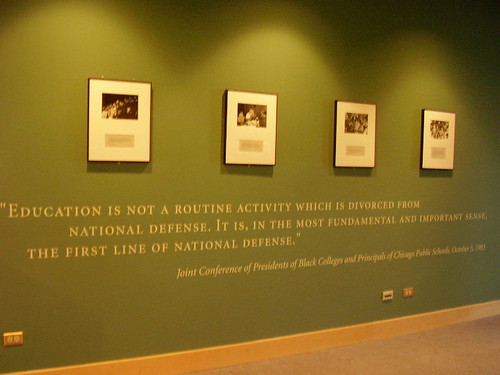This morning my friend Jeremy blessed us with a post about a project at the library school at UNC Chapel Hill entitled Blogger Perceptions on Digital Preservation. Not only is my comment on Jeremy’s post 5 times longer than everything he had to say about it, I still have more rant left in me that’s going to have to spill out here. (One can only abuse other people’s blogs so much.)
From their project website:
This research study grew out of calls in the literature of information and library science to regard these new vehicles for communication and information dissemination as valuable additions to the human record. The purpose of this research is to survey bloggers’ own perceptions on digital preservation. It is hoped that the results of this study will inform development of recommendations for impacting stewardship of weblogs at the level of creation, and the development of strategies for capturing the content of blogs for perpetuity.
I’ve heard about this kind of thing before. There are many librarians who think collecting blogs is the right thing to do. These are usually the pro-internet ones, the one who like blogs, use the term “web 2.0” with some fluency, know what a wiki is, have a profile on facebook, and maybe even use an RSS reader. They think it would be progressive for libraries to archive blogs in the same way they archive academic journals and Time Magazine. There’s a cultural currency at play there; as librarians, we underscore the value of one form of publishing when we opt to collect one variety of publication and exclude others. In selecting the American Historical Review and not The Inquirer for our permanent collection, we privilege one form of expression over the other; we say, this is worthy of your attention and a portion of our funds; this other thing is not. So I understand why so many digitally hip librarians are trying to widen the net and start scooping up blog posts as well as academic serial publications. It would be a act of friendliness toward us, of certain kind of regard; it would be, on one level, an act offering us a level of dignity that we so often fail to engender among the general population.
The first time I heard a librarian suggest that libraries start collecting blogs, it was like a punch in the stomach. I had a very irrational, visceral reaction to it that went like this: absolutely not, no, no way, stop now, please leave me alone. It was only later I stopped to think about it and tried to deconstruct why I had such a strong reaction to the idea.
The first issue is control. My blog is mine, and I can go back at any time and edit bits and pieces of it as I see fit. I’m particularly sensitive to the control issues around blogging, because I’ve been a blogger for many years and have been through many life-changing experiences throughout my time as a blogger. Not only have I dropped out of one graduate program and completed another, I’ve completely changed careers, moved many times, picked up and dropped hobbies, and thus I’ve changed the based focus of my blog multiple times. I’ve also grown up a lot since the beginning, and I learned through trial and error what is and is not appropriate to put on line. Actually, no, that’s not entirely a fair way to phrase that: it’s not nearly that simple. The things that were appropriate for me to put online in 2001 when I started blogging are no longer appropriate for me now that I’m a professional with a professional online presence. There are things I used to talk about on my blog back in 2001 and 2002 that I wouldn’t dream of posting now; it’s less a matter of cut-and-dried internet privacy and more a matter of direction. I’ve changed my direction, I’ve changed the purpose of my blogging, and so I’ve edited and pruned my blog as I went along. What if my blog had been archived back in 2001, and at intervals thereafter? What if someone had felt that I was part of creating a permanent public record?
I did say it in public, after all. Do we give up our rights to edit our work once it’s in the public sphere? Historically, yes; hard copies would be distributed, and the sheer logistics of it make that editing impossible. But we aren’t talking about a hard copy world, here. Why are we suggesting that the hard copy rules need to follow us into the digital sphere?
When I merged the first iteration of my blog (blogspot) into this one (wordpress), I brought it all over, the picked through it and locked a whole ton of posts. It wasn’t entirely a matter of being ashamed or having something to hide; they just weren’t in keeping with my current perspective on this blog. They didn’t fit into the open portfolio I’m keeping here. At some point, should those posts become relevant, I may re-release them minus the lock and refer to them. I deleted a bunch of stuff that just struck me as trite and boring, too. This is my archive, built and maintained primarily for myself and my friends, but others are welcome to visit and have a look through it as well. Does this openness strip me of my right to tweak my work?
There’s part of my objection: I felt that, should libraries collect my blog, keep a permanent archive for the public record, I would be losing something that’s important to me. I would be losing some ability to control my own work.
Most of the issue here seems based on a difference between old and new media, or old and new publication methods. We have ideas about works in progress, and we have a definite idea about what it means to be “finished”. We freeze things when they’re finished. We take a picture and say, there it is, it’s done now, and we mass produce the result. Novelists write and write, edit and edit, and finally finish their novels and hand them over. They’re published and, for the most part, that’s the end of the story. There are rarely revisions to published work; it’s gone out into the wild, it’s over now. There are millions of copies out there and there’s no taking them back. I know many writers who cringe when they look at their own published books, because they can still see errors that they can’t edit anymore. We take these fixed iterations of their work and put it in the library, because they’re done now. The stone tablet has been carved. This version of archiving is based entirely on the idea that the master copy is finite and complete, it’s the movable type all set in order, it’s the means of production rather than the product. The end user doesn’t have access to the master copy; once they have their version, they don’t look back at the master. But in the world of blogs, the master copy is the product. Sure, everyone takes their own copy; technically, every time you look at a website, you take a copy of it. In theory it’s the same master copy/copy world. But in practice, that copy is so ephemeral people often fail to understand that it even exists. They can fish a copy out of their browser caches, they can save copies down to their hard drives, but the vast majority of people believe that there is a single version of, say, a website, and in order to view it, they need to go to it and look. And when they do, their old copy is replaced by the new copy.
So why are we talking about taking still versions of blogs and sticking them in archives? Why are we taking a living document, killing it, and taking a picture? Where putting novels in libriaries provides the author with a distribution network, putting archived copies of blogs in repositories doesn’t increase distribution for the blogger. It merely creates a new master copy that the blogger has no control over. It takes away from the blogger.
However: libraries could always respect the rights of the blogger to constantly change their master copy simply by collecting their RSS feeds rather than the blog proper. If their parser checks back with the original document and syncs it, much like a browser does when a user goes back to a website and sees that something has changed, I could accept that. We could filter what goes to the library, and be very clear that some things are okay from that perspective and some things we keep just for us. That requires librarians to accept that we don’t have a complete or permanent record, however. We only have access to that information the blogger allows us to see, when they allow us to see it. And there’s no guarantee it will be the same the next time we go to look at it.
And that raises the question of the historical record. As a former historian-in-training I suppose I should be more sympathetic to this argument; someday some poor graduate student will do a dissertation about phd dropouts who become librarians and will want access to my blog. Well, that’s too bad for him, I’m afraid. He’ll have to hope that people like me will put something into the permanent historical record and not hope that someone someday will see the joy in archiving my digital voice, because I have no intention of ensuring that my blog stays around for centuries after my death. I’m not writing this for that future graduate student; I’m writing it as part of the dialogue that exists right now, a sort of extended public square conversation. It doesn’t exist in a vaccum, and is so dependent on the digital swirls of dialogue around it that I’m not sure it would make sense on its own. In fact, I’m not sure we should understand blogs as singular, decontextualized entities in the first place. (Though: can we even consider books as singular decontextualized entities, and am I inching toward complete nihilism here?)
I recently had a drink with a faculty member at my place of work who told me that his father destroyed all of his personal correspondence prior to his death. What right did he have to do this? Every right in the world, I have to say. Every right. There’s dignity in radio silence. Those letters weren’t written with the understanding of permanence. When we ask students to write something that won’t be seen by others and won’t be attached to their names, we can’t change streams weeks later and decide to make them public. We should have some respect for the boundaries in which a work was created.
When I was an undergrad I did some work in the National Archives of Canada on a project using letters written to the Prime Minister during the depression. As it turns out, if you really want to get into the permanent public record, send it to the Prime Minister’s office; they microfilm everything. EVERYTHING. The letters were private pleas from the desperately poor to the millionaire businessman prime minister at the time, R. B. Bennett. There were letters from children asking for skates, or for shoes so they could walk to school, or for pencils and paper. There were letters from men who couldn’t get jobs, and from women who were so distraught about their husbands’ financial emasculation that they sent secret letters to the PM asking for help. One of these letters had a note at the bottom: please destroy this letter once you’ve read it. That was from a woman so ashamed of the details she was writing about, so scared for her family, that she didn’t want a permanent record of it. And there I was, sitting in the archives in front of the microfilm reader, sixty years later, reading it. I felt sick. They should have destroyed that letter, and I couldn’t stomach the idea of taking notes on it and using it in my paper. I scrolled past it instead. Why did they film it? Did the person who took the shot of it cringe the way I did? But she did send it, didn’t she. She put it into the public record, with a postage stamp attached. It wasn’t intended for my eyes. At the time I knew I’d rather preserve her dignity than get one more source for a paper with hundreds and hundreds of sources already. There were other letters I could draw from to write that paper, there are other ways to get at that information without breaking a sort of historical trust. She had been wronged.
Some things were created to be, and should remain, ephemeral.













 feminist
feminist